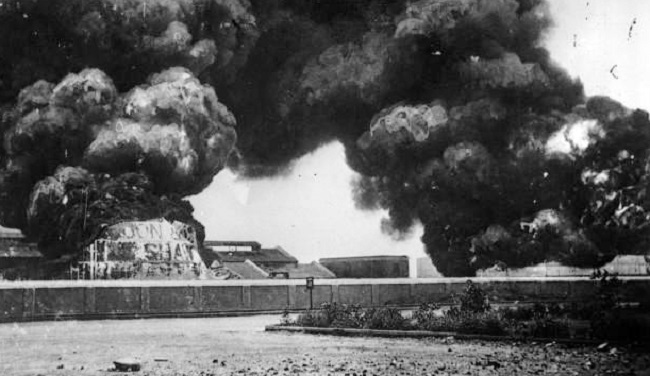Numerous terrible things happened during World War II. Numerous films have made valiant attempts to capture the utter terror of those terrible days.
There were events that occurred during this time that are usually only mentioned in passing and should be presented in their proper context because of how important they were to the overall war effort.

Contents
Is the Bombardment a True Story
What Ole Bornedal has done with his Netflix feature The Bombardment (also known as The Shadow in My Eye in Denmark) is exactly this.
Based on a true story, The Bombardment captures a moment in time during the second world war when the UK’s Royal Air Force mistakenly bombed a school, instead of the Gestapo stronghold in Copenhagen, Denmark which was under the dominion of Germany.
Somewhere in the neighbourhood of 125 individuals were killed during “Operation Carthage,” the vast majority of them being students at the school; this is a terrible injustice that hasn’t been talked about nearly enough until now.
Top European actors including Alex Hgh Andersen (Frederik), who is known for his role as Ivar on the popular TV show Vikings, and Danica Curcic (The Chestnut Man) are featured in the film.
Yet, I was unhappy to observe the underuse of these two actors within the script, as their roles were rather buried in a cluster of other tiny subplots. The two performers gave outstanding performances, pouring their hearts into the roles.
That the film’s first act is such a disorganised jumble is indicative of my main complaint about it. The world-building and the beginning scene-setting were quite disordered with the editing also being highly abrupt.
Trying to make sense of the film’s plot, I sped from one scene to the next, meeting new characters each time. The audience was left to figure out the significance of a scene on their own due to the scant exposition.
Eventually, the second act gets going and the tone changes drastically as the plot picks up speed in preparation for the Royal Air Force bombardment. When the tragedy of the actual incident occurs, the film’s narrative really comes together.
The scenes are stunningly photographed, and they perfectly convey the anguish and agony of war and its effects on civilians. Young actors on set deserve all praise for their portrayal of the tragedy in Denmark.
Cast as Henry and Eva, respectively, by Bertram Bisgaard Enevoldsen and Ella Josephine Lund Nilsson, they tapped into something so fascinating and visceral that it leaves you troubled and shocked. I like Henry’s story as a whole, and I think the development of his character is especially effective toward the end.
This is when Bornedal makes the film’s main argument. After this tragic blunder, 125 people were made to pay the price, and the lives of the citizens of Copenhagen were altered irrevocably.
Everything about the second part of this story—the acting, the pacing, the score’s use of suspense, and the visual effects—captures the horror that unfolds on that day in history.
Although The Bombardment has trouble getting started, it succeeds in setting up the film’s main conflict.
Last Words
The second half of this film contains some extremely horrifying moments that were the emotional payoff from the performances of the ensemble, nailing the pace, and generating a tension that will leave your heart racing, and your hands clamped over your mouth.
This narrative of loss and suffering is not for the weak of heart, but it must be recounted so that those lives will not be forgotten.






























